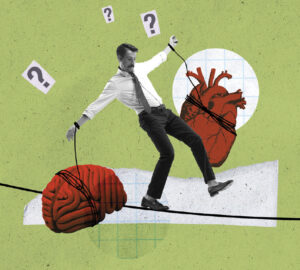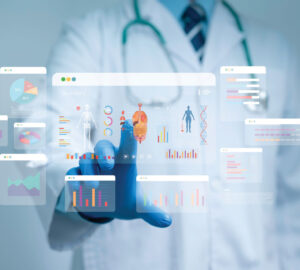No one is a stranger to stress. From the classroom to the boardroom to the family room, stressors are all around us. While it may be impossible to completely avoid them, research shows that long-term or chronic stress can impact the body in devastating ways. Professionals weigh in on how high levels of anxiety can impact your health, especially when dealing with a major medical issue.
pregnancy
Often, a bundle of joy comes with a bundle of new stressors. Pregnancy is a time filled with change, and the transition can have serious consequences. march of Dimes links high levels of stress to increased chances of having a premature or low-birthweight baby. It is vital for the mom-to-be to consider her own health throughout the process.
a range of emotions
Jennie Oberkrom, a licensed clinical social worker and psychotherapist with Signature Medical Group, has dealt with many stressful pregnancies as the clinical program coordinator of Signature’s Strong Start Maternity Care Home Model, which integrates behavioral health into maternity care for expectant mothers on medicaid. “The medicaid population has a variety of concerns,” Oberkrom says. “Life stressors, however, impact every woman. This is a major life transition. there a lot of emotions that women have to navigate. they can feel very torn about how a baby will impact their identity.”
Unfortunately, expectant mothers’ emotional stresses are not always validated. “There is a stigma around mental health concerns and life stressors,” Oberkrom says. “Everyone pictures a happy mom with a glowing face and smile, but that doesn’t entirely account for what’s really happening during this time of adjustment. Women can feel ashamed of their varied emotions, so it’s important for their support team to make them feel uplifted and empowered. It should be anormal part of treatment.”
mental health
It is very important for expectant mothers to be aware of their mental well-being. “We only hear about postpartum depression, but about 20 percent of women will experience some kind of pregnancy mood disorder, including perinatal depression,” Oberkrom says. She further explains that every woman is at risk even if she hasn’t had previous depression or anxiety concerns. “The important thing is to seek treatment if you think you’re dealing with more than just day-today stressors,” Oberkrom says. “Women need to care for their personal needs. Mothers often aren’t used to putting themselves first, but they have to understand the importance of basic self-care.”
cancer
There’s little doubt that a cancer diagnosis is one of the most stressful things a person can face. The burden on your body, both physically and emotionally, can have deep physiological impacts.
disrupting the system
“Stress results in system-wide adaptation,” says Dr. Varsha Rathod, an integrative medicine physician at PALM Health. She explains that acute or short-term stress is like a deer fleeing from a hunter. The deer’s systems focus entirely on getting its muscles to work so it can run and escape. Once the deer gets away and the stress is gone, the systems return to their normal functions. “But when these stress responses are chronic, they become malfunctions,” Rathod says. “The deer cannot survive if its body is continually in panic or flight mode. Stress can become maladaptive.” According to Rathod, a major physiological impact of stress is a compromised immune system that may be less able to fight disease. “Think of your immune system as a group of police officers patrolling a beat,” she says. “If the body is under chronic stress, more and more officers are pulled off their regular beats to deal with the stress. Your body isn’t being protected the way it normally is.” A major function of the immune system is surveying and destroying cancer cells, according to Rathod. “When you have too much stress, you’re lessening your immune system’s response, which lowers the amount of invading cells being destroyed. It becomes more likely that packs of cancer cells can grow and spread.”
a diagnostic shock
With cancer, the weight of stress can begin taking a toll at diagnosis, according to Rathod. “Cancer has an urgency associated with it. When patients are diagnosed, their first thought often is, ‘I’m going to die,’” she says. She explains that this sense of doom can impact how patients make treatment decisions. Because they think everything has to be decided quickly, they might make rash choices, and negative side effects associated with many treatments can create more stress. Dr. Teresa Deshields, a psychologist at Siteman Cancer Center, agrees that how you handle a diagnosis is hugely impactful. “There’s a lot of uncertainty about treatment and how it works. It becomes a challenge,” she says. “When people are stressed, it becomes difficult to think normally. Once patients hear the word ‘cancer,’ they cannot process the other information the medical team is giving them. The news is too devastating.
a team effort
Medical teams are responding to this issue and addressing stress head-on. “The Commission on Cancer has mandated that accredited cancer centers start distress screenings,” Deshields says. “The idea is to identify whether patients are struggling, and get them the help they need so it doesn’t become detrimental to their treatment.” According to Deshields, these screenings are multifaceted, addressing psychological, emotional, familial, spiritual and practical difficulties. “The goal is to treat the whole patient. For the most effective cancer treatment, we can’t just worry about blood markers and CT scans,” she says.
cardiac health
“There is no way to objectively quantify stress levelS,” says Dr. Michael Lim, a SLUCare cardiologist at SSM Health Saint Louis University Hospital. “Everyone should ask, ‘How much is stress affecting me?’ But if you’re already concerned about it, that means you have a fair amount of stress in your life.” The fight-or-flight reactions that follow stressful situations can lead to a heart attack or other cardiac event, according to Lim. “We’ve always known that one of the most significant heart attack factors is stress,” he says. “A study recently was released on the amygdala, the part of the brain that measures stress. It found that the higher the activity in the amygdala, the higher the risk of heart attack.”
unhealthy responses
Dr. Mark Vogel, a cardiologist with Mercy Clinic Heart and Vascular, agrees that physiological responses to stress can make the body susceptible to a cardiac event. “The exact link is still being researched, so it’s not entirely known,” he says. “But we do know that part of the body’s fight-or-flight response is releasing adrenaline and increasing heart rate and blood pressure.” Vogel further explains that the ways people choose to cope with stress can put them even more at risk. “Coping mechanisms often can be detrimental. People might start smoking, drinking or eating in excess,” he says. “These create known cardiovascular risks that absolutely can increase the chance of heart attack or stroke.
a broken heart?
Heart attack and stroke are not the only cardiovascular events that can come from stress; another is stress-induced cardiomyopathy or ‘broken heart syndrome.’ “It occurs after a major stressor, such as the loss of spouse or child,“ Vogel says. “The ejection fraction, or squeeze of the heart, can be reduced.” It is often called takotsubo cardiomyopathy, which comes from the Japanese word for an octopus trap, because part of the heart takes the shape of a fishing pot. “During takotsubo cardiomyopathy, the classic symptoms of a heart attack are presentpressure, tightness, heaviness in the chest, shortness of breathbut there are no blockages,” Lim explains. “There is no problem with blood flow. It’s an issue with heart function, and it’s completely stress-induced.”
healthy choices
Both Lim and Vogel advocate implementing healthy lifestyle changes to deal with stress. Lim suggests limiting screen time. “From a societal standpoint, most of our daytime hours are highly stressed because electronics keep us tethered to stressful parts of life,” he says. “Even taking just a 20-minute walk without your phone can be helpful and stress-relieving.” Lim also recommends sleeping with your phone in another room or turning it off. “Getting a good night’s sleep is essential to get the body and brain ready for dealing with whatever the next day brings.” Vogel advises against unhealthy coping mechanisms. He also emphasizes the importance of talking to a doctor. “If people start to feel overwhelmed, they need to let their doctor know,” he says. “Stress can be difficult to notice in a physical exam. We don’t know if our patients are honest about it. Discussion can serve as a starting point for implementing healthy behaviors.”








